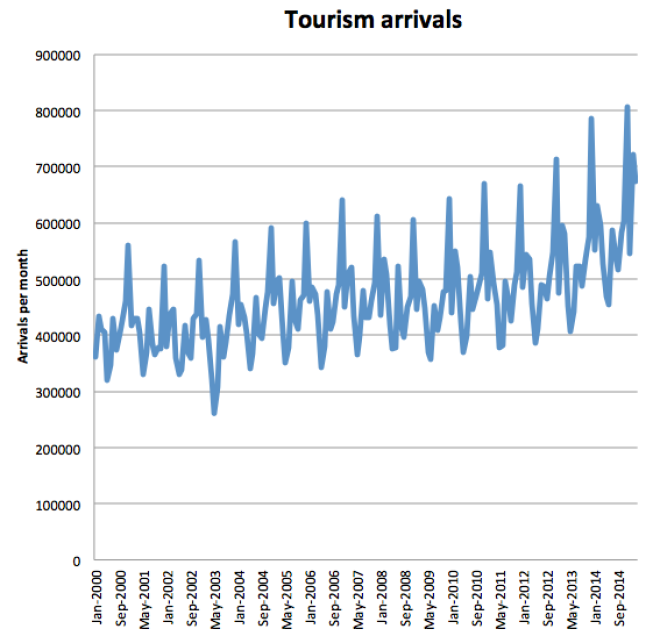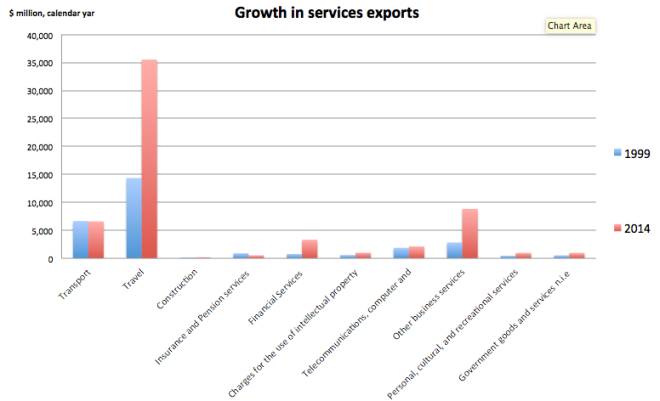There’s an industry on the brink of a break-out, and it doesn’t require us to learn C++. It would rather we learned to smile widely.

That industry is tourism.
Tourist arrival numbers hit records in November, December, February and March. Glancing at this graph of the last 15 years tells us we’re onto a winner. Look at that uptick since 2012!
 Arrivals in March 2015 were 13 percent higher than a year ago. Arrivals in February were 14 per cent higher.
Arrivals in March 2015 were 13 percent higher than a year ago. Arrivals in February were 14 per cent higher.
It’s time to turn your place into an AirBnB, people. There are already dozens of listings within walking distance of my house.
 And it is more than just a cottage industry. There are thousands of real jobs available in the sector too.
And it is more than just a cottage industry. There are thousands of real jobs available in the sector too.
 That’s five times the number of jobs I could see in mining.
That’s five times the number of jobs I could see in mining.
 The tourism sector has been in growth mode for a long while, although we don’t celebrate it much.
The tourism sector has been in growth mode for a long while, although we don’t celebrate it much.
Politicians are more likely to say they want to live in a country that makes things.
Are we somehow ashamed of tourism? Do we feel it debases us to offer hospitality to visitors? While it’s somehow strong and tough to make things and send them to those same people?
Bangladesh makes a lot of things. I’d rather live in a place people want to visit.
We can make Australia better for tourists by improving transport in our cities and nation-wide, by teaching languages, and by preserving our natural environment.
A politician that made tourism the centre-piece of their economic recovery plan would get my vote.

Except, it’s an industry that’s highly susceptible to exchange rate fluctuations. Sure we’re doing well now with low interest rates, and exchange rates. But if that changes, which it will, we’re back at square one.
LikeLiked by 1 person
Most people think that our exchange rate will fall in the medium to long term. I guess that’s an unspoken assumption in there. The recent highs were very unusual, due to US quantitative easing and the mining boom crossing paths.
And susceptibility to exchange rates is a feature of all export industries, not just tourism. While raw materials exports will hit a limit as China grows richer, exports of experiences and premium products will still have a looong way to grow.
LikeLike
I usually find it difficult to disagree with your posts, but I thought I’d chime in on this one.
I’m concerned that whilst “preserving the natural environment” might be a requirement for encouraging tourism, the reverse probably doesn’t hold true. Tourists and potential tourists are/would be predominantly flying in from that other hemisphere and using a signficant fraction of their yearly greenhouse gas emissions to do so.
This is not purely an environmental phenomenon though. The heavy promotion of tourism also has the capacity to kill what makes a place culturally interesting as well. Thinking here of Bali, Florence, Venice, Paris, most other old city centres in Europe, and in fact anywhere fortunate/unfortunate enough to be within 2-3km of a “major attraction”. Tourism aggressively turns the world into versions of Disneyland – overly romanticised ideas about the past, and never a vision for the future. (For the record, yes, I have been on the Space Mountain ride).
Australia itself is presented in the shallowest possible terms: a few surf beaches, some kangaroos, koalas and happy Aboriginal people parading around in the bush. I think Australians might be “ashamed” of tourism because they want to imagine themselves in more “productive” terms than these.
LikeLike
Some meaty objections there Tom. Thanks.
I think the point about flying is a good one. While some nations have carbon targets and pricing to limit their national emissions, not every nation does. So foreign airlines arriving here will always be emitters until some sort of global carbon accord is sealed. But is there anything we can do about that? I don’t think so. Not grabbing a share of global tourism seems one of the most costly ways to counter climate change.
As for whether tourism kills a place, that’s an interesting question. Venice is absurdly crowded. So is the Louvre, the Great Wall of China and the steps of the Opera House. But they’re still evdiently worth visiting. The objection puts me in mind of the old saying – “nobody goes there any more, it’s too crowded.”
As for your sense people come to Australia for shallow reasons and we’re ashamed of that, you might be right. But surely we can promote ourselves differently rather than not at all. Here are some culturally rich things that bring people to Australia – MONA, the great barrier reef, Uluru, the architecture of the Opera House, our restaurants.
LikeLike
i feel it’s more part of having a well diversified economy, rather than being a country that just digs, just makes, just codes or just rents out the spare room.
So while I support the suggestion of using tourism as part of keeping the economy going, I have two further thoughts for you:
1. Greece
2. AirBNB. I’m all for it, but I’d hate the only way we can afford to live in our own cities is by hosting tourists in our home! How do we make sure it doesn’t just lead us to borrowing more to buy the same property?
LikeLike
re: 1. Our corruption is low; our debt is manageable. I’m confident we’re not Greece
re 2. I see this as a productivity increase! It’s like any boost to income. You can invest it in your home, or elsewhere. If it raises the value of homes, so be it. We do however need to make sure AirBnbpreneurs are obeying laws paying tax!
LikeLike
I usually find it difficult to disagree with your posts, but I thought I’d chime in on this one.
I’m concerned that whilst “preserving the natural environment” might be a requirement for encouraging tourism, the reverse probably doesn’t hold true. Tourists and potential tourists are/would be predominantly flying in from that other hemisphere and using a signficant fraction of their yearly greenhouse gas emissions to do so.
This is not purely an environmental phenomenon though. The heavy promotion of tourism also has the capacity to kill what makes a place culturally interesting as well. Thinking here of Bali, Florence, Venice, Paris, most other old city centres in Europe, and in fact anywhere fortunate/unfortunate enough to be within 2-3km of a “major attraction”. Tourism aggressively turns the world into versions of Disneyland – overly romanticised ideas about the past, and never a vision for the future. (For the record, yes, I have been on the Space Mountain ride).
Australia itself is presented in the shallowest possible terms: a few surf beaches, some kangaroos, koalas and happy Aboriginal people parading around in the bush. I think Australians might be “ashamed” of tourism because they want to imagine themselves in more “productive” terms than these.
LikeLike
I respectfully disagree. Tourism provides large numbers of low skilled, low paying jobs. If you change the search criteria on your Seek example you will see there are only 38 hospitality and tourism jobs which pay 100k – 200k. There are 2,345 jobs listed in the same salary bracket for the Information and Communications sector.
Melbourne, and its highly skilled and creative population can excel in this area. Not just locally, but internationally.
While the social, culture and environmental benefits of tourism are unquestionable, suggesting Tourism should be the centre piece of an economic recovery seem like a step backwards.
LikeLike
Fair point. High paying jobs would be better. I’ve no serious rebuttal here other than to say that some people (not me) mourn manufacturing jobs that are similarly low-pay, low-skill. There are sectors of the community who think we need lots of such jobs.
LikeLike
The exciting part about ‘making things’ is the use of our little grey cells – those same grey cells that will sharpen our discrimination filters for a post truth world.
I would much prefer a cerebral Australia to a service economy Australia – I don’t want to be Donalds servant.
LikeLike